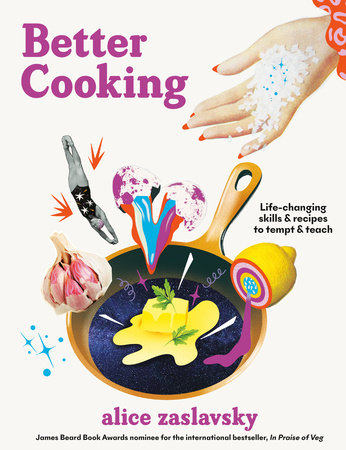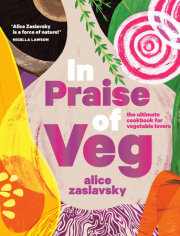Excerpt from the Introduction
What does it mean to be a "good" cook? The flick of a wrist, a pinch of the fingers, the whiff of a waft. It’s intuition and muscle memory. It’s a way of life built on a foundation of flying hours.
From time spent at your grandmother’s apron strings, podding fava beans and rolling pasta dough between chubby fingers. From home economics classes, rubbing butter into scone dough, committing the crack of golden caramel to canon and the reward of some kind of sweet slice to scoff on the school bus home. From student suppers, haphazardly flung together with bits rummaged from the veggie crisper, sploodged with whatever sauce is lurking in the fridge door until it makes some semblance of sense. From "potlucks" and "grown-up" dinner parties where you learn to keep things simple … eventually. It’s first dates, and first sunken cakes hidden under cream.
But what happens if you missed a stage? Or three?
You’re not alone. As we’ve become busier, the intergenerational family experience has become less common, and schools turn kitchens into science labs, when does the practice plane actually take off to get those flying hours under the belt? And when it
does come time to start, how do we make the experience of cooking something to actually look forward to?
First of all, let’s toss out the concept of being a "good" cook, and replace it with the idea of becoming a
better cook. Better cooking is a lifelong journey. It’s made up of single steps, with plenty of whoopsies and notes-for-next-time along the way. But every step gets you a bit closer to cracking the codes that unlock the confidence to feel freedom and joy in the kitchen.
I believe that "foodie" is a word to be embraced rather than shirked, because it can also mean more conscientious consumption. But foodie culture also has a lot to answer for when it comes to making newbies feel out of their depth. Shaking off the imposter syndrome that can plague anyone who’s watched a fancy food show or heard the loaded line "It’s just that easy" from a TV chef, can feel impossible if we’re stuck at the first hurdle. It can mean people give up and label themselves "bad cooks" or say they "don’t cook" and never try.
Labels are powerful, for better or worse. I’m here to tell you that
you are already a better cook than you think you are.If you’ve ever found yourself thinking about dinner over breakfast, if bringing pleasure and nourishment to the people in your orbit gives you a glow, heck—if you already enjoy the
eating part, you can find the fun in getting the food to the table, too.
Forget about cooking for someone else’s tastes or expectations. I’ve tried doing that in the past, and would strongly not recommend. Why? Because fear lives here, and the paralysis of choice. Oh, and doubt, of course, about what it is you should be doing, and whether you’re
good enough.
The
joy of better cooking, is that you can stop second-guessing yourself. You can look into the fridge/freezer/pantry and instantly start to see ideas and inspiration before you, rather than feeling overwhelmed or at a loss. Relax into the rhythm, release any expectations of perfection or outcome. Go with the flow, take a breath, and remind yourself: I’ve got this.
Oh, and you’ve got
this. I’ve designed this book to act as an instruction manual, but you’d never know it. In fact, forget I ever said that. Instead, I’ve written a book with 70-ish recipes—plus loads of recipe riffs—that I know you’ll want to cook, on a weekly basis, again and again, with heaps of extra tips and tricks so that, soon enough, cooking the recipes will feel like second nature. Like that scene in
The Matrix where Trinity learns to fly a helicopter while she sleeps. You won’t even know you’re learning, until the learning has been done.
The recipes are stacked in sections from what I perceive to be easy to harder, as a gateway to lure you in, because I figure that anyone who loves to eat will get hooked on the slapping and dashing and not even notice when they start pulling out show-stopping sweeties on the reg. The techniques are transferable, and often come up multiple times to scaffold the skill and help it sink in permanently. If you’re stuck on a skill or a fancy-looking cooking word, remember to check the index—it’ll probably have some form of extrapolation in another part of the book.
Copyright © 2024 by Alice Zaslavsky. All rights reserved. No part of this excerpt may be reproduced or reprinted without permission in writing from the publisher.







